Introduction to Lida Group and Its Role in Disaster Relief
Lida Group, a pioneering force in the construction industry, has earned its reputation as a leader in providing innovative solutions for disaster relief efforts. With decades of experience in designing, manufacturing, and delivering high-quality temporary container buildings, Lida Group has become an indispensable partner for governments, NGOs, and humanitarian organizations around the world. Their commitment to excellence is evident through their comprehensive range of products tailored specifically for emergency response scenarios.
The significance of Lida Group’s contributions to disaster relief cannot be overstated. In times of crisis, whether natural disasters like earthquakes, floods, or hurricanes, or man-made emergencies such as conflicts or pandemics, the need for rapid deployment of reliable infrastructure is paramount. Lida Group’s temporary container buildings offer a versatile solution that meets these urgent demands. These structures are designed to be quickly assembled on-site, providing immediate shelter, medical facilities, command centers, and other essential services that are crucial during the critical early stages of disaster response.
Moreover, Lida Group’s dedication extends beyond just supplying materials; they provide end-to-end support from planning and logistics to installation and maintenance. This holistic approach ensures that aid workers and affected communities have access to functional, safe, and comfortable environments even under the most challenging circumstances. By leveraging advanced technologies and sustainable practices, Lida Group continues to enhance the effectiveness of disaster relief operations, ultimately saving lives and aiding recovery efforts more efficiently.
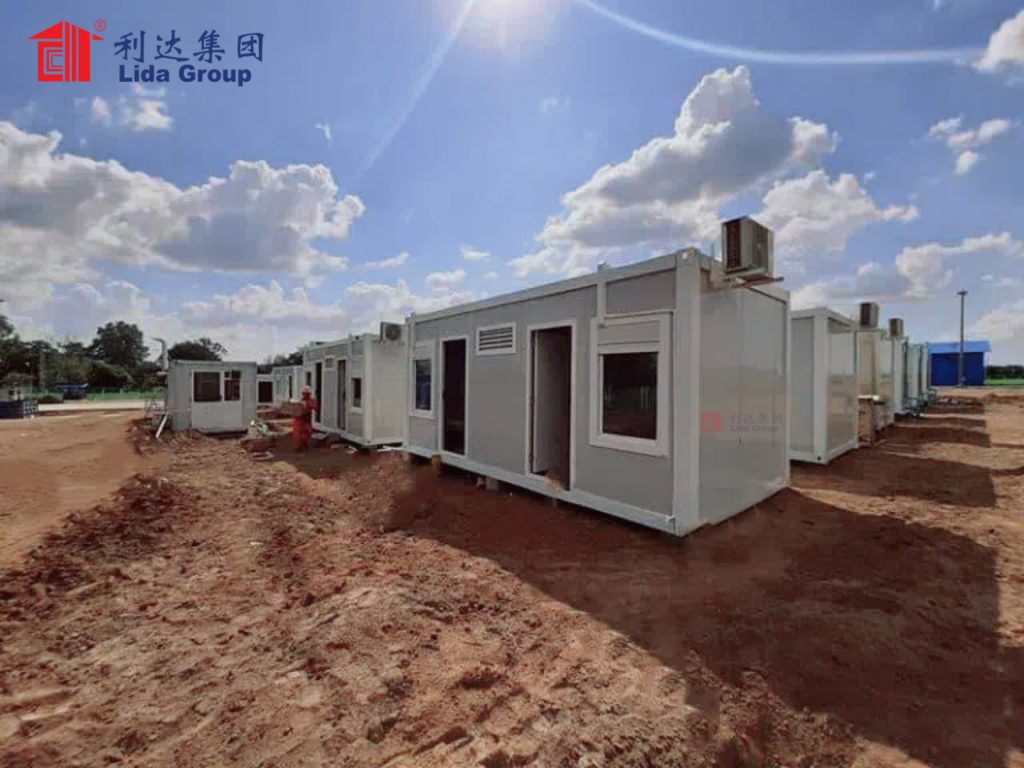
Key Features of Lida Group’s Temporary Container Buildings
Lida Group’s temporary container buildings are engineered with a suite of features that make them uniquely suited for disaster relief operations. At the core of their design philosophy is modularity and scalability, which allow these structures to adapt seamlessly to various needs and locations. Each unit can be easily connected or expanded, enabling the creation of large complexes such as field hospitals, refugee camps, or emergency supply depots within a short timeframe. The modular nature also facilitates efficient transportation and rapid assembly, significantly reducing the time required to establish operational facilities in disaster-stricken areas.
Durability and resilience are critical attributes of Lida Group’s containers. Constructed from high-grade steel and reinforced with weather-resistant coatings, these units can withstand harsh environmental conditions including extreme temperatures, heavy rainfall, and strong winds. This robust construction ensures that the buildings remain stable and secure throughout the duration of the relief effort, offering reliable shelter and operational bases for responders and displaced individuals alike. Additionally, the use of durable materials minimizes maintenance requirements, allowing resources to be allocated more effectively towards other pressing needs.
Ease of setup is another key feature that sets Lida Group’s containers apart. Pre-fabricated components and standardized assembly procedures mean that minimal specialized skills are needed for installation. A team of trained technicians can erect multiple units in a matter of hours, drastically cutting down the time between delivery and operational readiness. This efficiency is particularly valuable in disaster zones where every minute counts. Furthermore, the inclusion of user-friendly installation guides and technical support ensures that local teams can manage setup processes with confidence, enhancing overall responsiveness.
Safety and comfort are non-negotiable elements in any disaster relief scenario, and Lida Group places significant emphasis on these aspects. All units are equipped with safety features such as fire-retardant insulation, secure locking mechanisms, and emergency exits. Comfort is addressed through well-ventilated spaces, climate control systems, and ergonomic furnishings, ensuring that occupants can maintain their health and morale during extended stays. Advanced water and sanitation systems are integrated into the designs, promoting hygiene and preventing disease outbreaks among vulnerable populations.
In summary, Lida Group’s temporary container buildings combine the advantages of modularity, durability, ease of setup, and enhanced safety and comfort. These features collectively contribute to creating resilient and effective disaster relief infrastructures that stand up to the rigors of emergency situations while supporting the well-being of those in need.
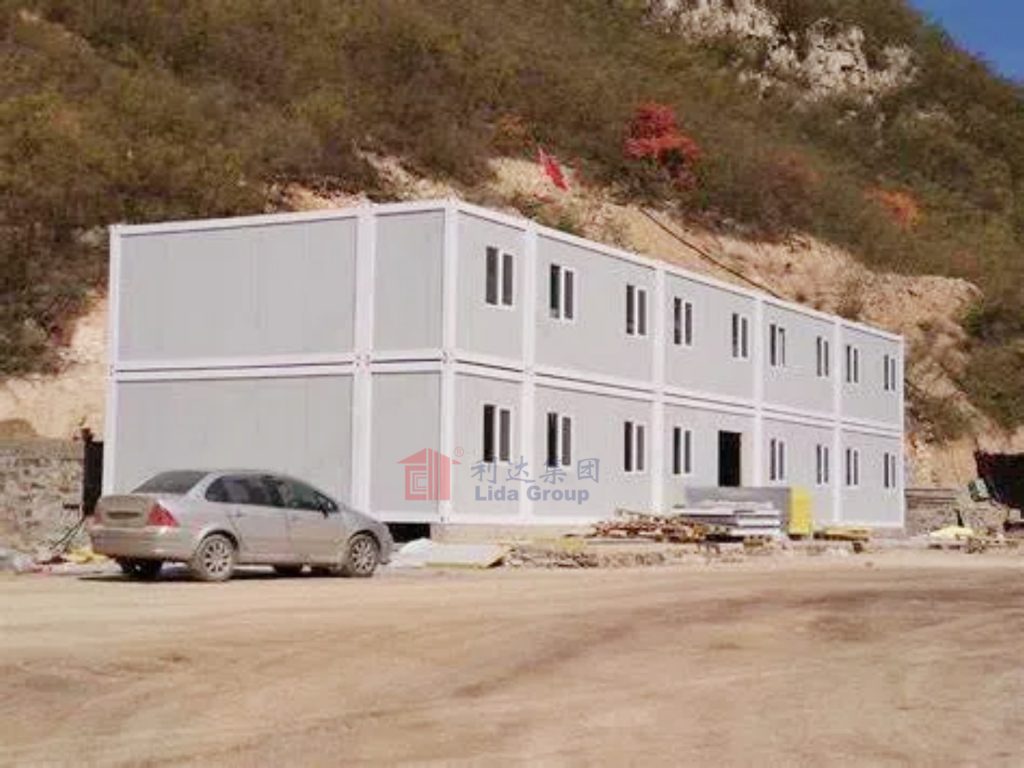
Manufacturing Process of Lida Group’s Prefab Containers
The meticulous manufacturing process behind Lida Group’s prefab containers is a testament to their commitment to quality and innovation. It all begins with advanced planning and design tools, where Building Information Modeling (BIM) software plays a pivotal role. BIM enables engineers and architects to create detailed digital models of each structure, allowing for precise coordination and real-time collaboration among different stakeholders. This technology not only reduces errors but also enhances the accuracy of project timelines and resource allocation, ensuring that each building is crafted according to exact specifications.
Material selection is another critical phase in the production line. Lida Group prioritizes sustainability by sourcing eco-friendly materials such as recycled steel and composite panels made from renewable resources. These materials are chosen not only for their durability but also for their minimal environmental impact. Advanced insulation materials, often derived from natural fibers, are incorporated to optimize thermal performance, thereby reducing energy consumption and maintaining comfortable indoor conditions. Low-VOC paints and finishes are used to improve air quality inside the containers, contributing to healthier living and working environments for occupants.
Precision engineering techniques are employed throughout the fabrication process to ensure consistency and reliability. Automated CNC machines and robotic arms handle tasks with unparalleled accuracy, minimizing human error and enhancing structural integrity. Laser cutting technology guarantees clean and precise cuts, while robotic welding adds strength and durability to the joints. Quality control measures are embedded at every stage of production, utilizing sensors and cameras to monitor assembly lines for defects. Any discrepancies are immediately flagged and corrected, ensuring that every component meets the highest standards of craftsmanship.
Sustainable manufacturing practices are integral to Lida Group’s ethos. Waste reduction strategies include optimizing material usage and recycling scrap metal, thus minimizing environmental waste. Water conservation systems are implemented to reduce consumption, and renewable energy sources power parts of the manufacturing process, further aligning with green initiatives. By adopting these sustainable practices, Lida Group contributes to a more environmentally responsible construction industry.
Efficient transportation and on-site assembly are facilitated by careful logistical planning. Modular units are pre-fabricated and packaged to ensure safe transport via trucks, ships, or trains. Upon arrival at the disaster site, skilled technicians swiftly assemble the buildings using clear guidelines and pre-planning, minimizing disruptions and accelerating the transition from delivery to occupancy. This streamlined process underscores Lida Group’s ability to deliver rapid, reliable, and sustainable solutions in times of crisis.
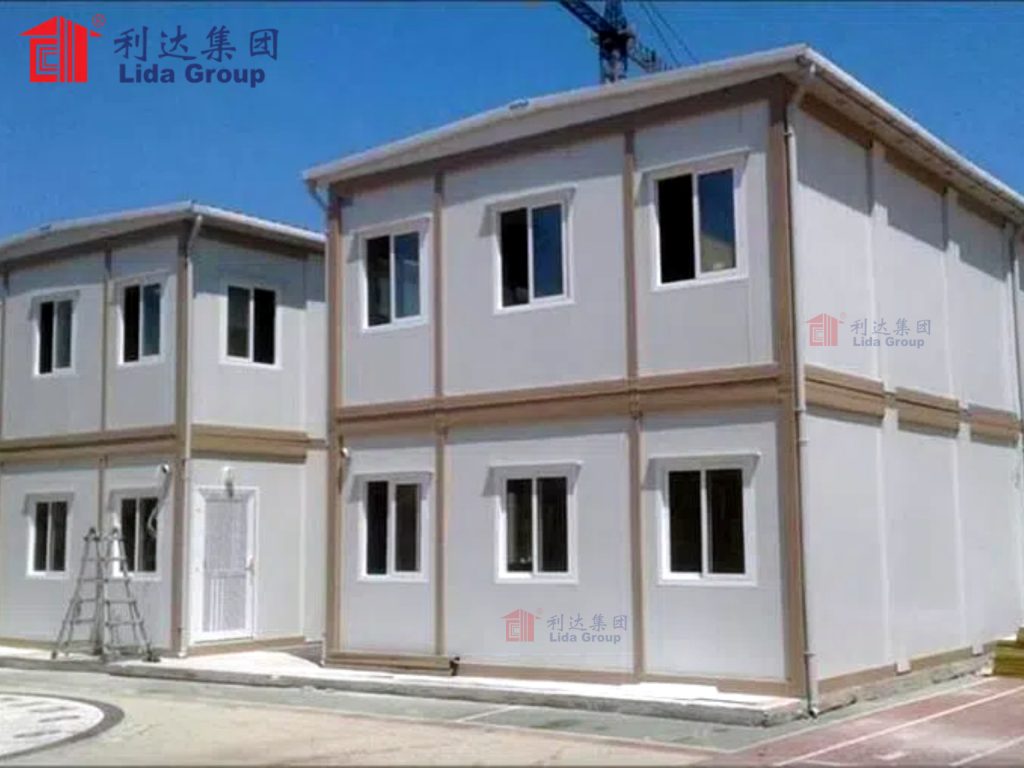
Applications of Lida Group’s Prefab Containers in Disaster Relief
Lida Group’s prefab containers have been widely utilized across various sectors of disaster relief, showcasing their versatility and effectiveness. One notable application is in establishing mobile clinics and hospitals, where the speed and flexibility of these structures are invaluable. During the 2015 Nepal earthquake, Lida Group rapidly deployed several modular medical units that served as triage centers and operating rooms. These facilities were equipped with all necessary medical equipment and utilities, allowing healthcare providers to deliver timely and adequate care to injured survivors. Patient testimonials highlighted the importance of having accessible medical infrastructure amidst the chaos, underscoring how these prefab units can save lives and alleviate suffering.
Another critical application is in setting up temporary shelters for displaced persons. After the devastating Typhoon Haiyan hit the Philippines in 2013, Lida Group provided hundreds of prefabricated housing units to accommodate families who had lost their homes. These shelters offered a secure and comfortable environment, complete with basic amenities such as beds, lighting, and sanitation facilities. Residents expressed gratitude for the immediate relief provided by these temporary homes, which helped restore a sense of normalcy and security in the aftermath of the disaster.
Emergency command centers represent another vital use case for Lida Group’s prefab containers. During the Ebola outbreak in West Africa, rapid-response teams required strategic hubs to coordinate containment efforts and distribute supplies. Lida Group supplied fully functional command centers that included communication systems, office spaces, and storage areas. These centers played a pivotal role in streamlining operations and facilitating effective responses, as evidenced by positive feedback from aid workers who praised the efficiency and reliability of these facilities.
Logistics and supply depots are yet another area where these containers prove indispensable. Following the 2010 Haiti earthquake, Lida Group constructed numerous storage units to house essential supplies such as food, water, medicine, and clothing. These units were strategically placed to optimize distribution networks, ensuring that aid reached those most in need without delay. Feedback from humanitarian organizations emphasized the value of having robust and organized storage solutions, which contributed significantly to the success of relief operations.
Lastly, educational and community support facilities have also benefited from Lida Group’s prefab containers. In post-disaster settings, it is crucial to re-establish schooling and social services promptly. After the 2018 Sulawesi earthquake and tsunami in Indonesia, Lida Group built temporary schools and community centers that allowed children to resume their education and adults to participate in rebuilding activities. Teachers and community leaders appreciated the quick turnaround and the quality of these makeshift facilities, noting their positive impact on mental health and social cohesion.
These diverse applications demonstrate the multifaceted utility of Lida Group’s prefab containers in disaster relief. From medical care to shelter, command centers to logistics, and education to community support, these structures play a pivotal role in addressing the myriad challenges faced during crises. Client testimonials and case studies consistently highlight the practical benefits and transformative potential of these innovative solutions, reinforcing Lida Group’s reputation as a trusted ally in global disaster response efforts.
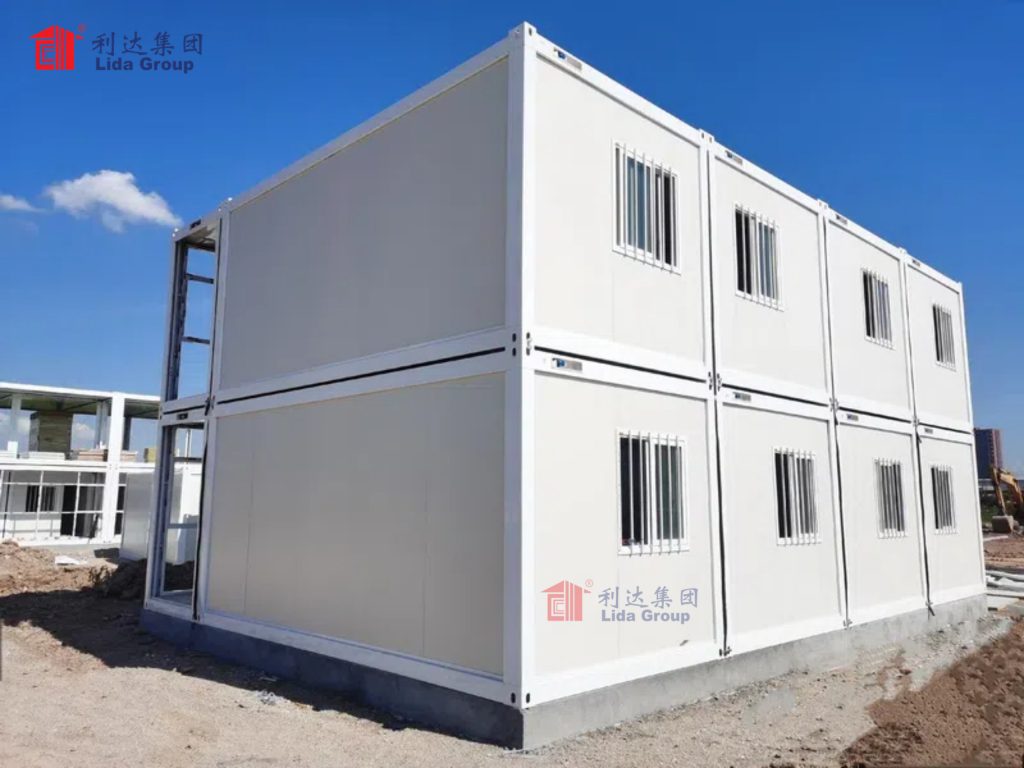
Case Studies: Success Stories of Lida Group’s Prefab Containers in Disaster Relief Efforts
One compelling example of Lida Group’s impactful work is their involvement in the 2017 Hurricane Maria relief efforts in Puerto Rico. As the island grappled with widespread devastation and loss of infrastructure, Lida Group swiftly deployed a series of modular medical units to serve as emergency clinics. These facilities were instrumental in providing immediate medical attention to thousands of affected residents, many of whom suffered from injuries and illnesses exacerbated by the storm. The modular design allowed for seamless integration of various departments, including triage, surgery, and recovery wards. Local healthcare providers reported significant improvements in patient outcomes due to the timely availability of these medical units. Additionally, the robust construction of the containers ensured stability and safety even under severe weather conditions, earning praise from both medical staff and patients alike.
Another remarkable instance is Lida Group’s contribution to the Syrian refugee crisis. In partnership with international aid organizations, they established multiple temporary settlements equipped with prefab shelters and communal facilities. These shelters provided refugees with much-needed privacy and protection from harsh weather, significantly improving living conditions compared to makeshift tents. Community centers and schools were also set up to foster a sense of normalcy and continuity for displaced children. Educators and parents alike noted the positive influence of these structured environments on children’s emotional well-being and academic progress. The successful implementation of these projects demonstrated Lida Group’s ability to tailor their solutions to specific cultural and humanitarian needs, fostering resilience and hope among vulnerable populations.
In the wake of the 2019 Cyclone Idai in Mozambique, Lida Group was called upon to construct emergency command centers and logistics hubs. These facilities became central points for coordinating rescue missions, distributing aid, and managing communication channels. The command centers featured state-of-the-art communication systems, enabling real-time coordination between various agencies involved in the relief efforts. Logistics hubs were equipped with efficient storage and inventory management systems, ensuring that essential supplies reached remote areas without delays. Aid workers credited these infrastructures with enhancing the overall effectiveness of the response, highlighting how Lida Group’s prefab containers transformed chaotic situations into organized and productive operations.
Furthermore, Lida Group’s role in the 2020 Beirut explosion response exemplifies their capability to mobilize quickly and efficiently. Within days of the blast, they delivered portable shelters to serve as temporary homes for families whose residences were destroyed. These shelters were designed to be both functional and dignified, providing essential amenities such as beds, kitchens, and bathrooms. Residents expressed profound gratitude for the immediate relief provided by these accommodations, which alleviated some of the trauma experienced in the aftermath of the disaster. The swift deployment and high-quality construction of these units underscored Lida Group’s unwavering commitment to delivering tangible support during times of acute crisis.
These case studies vividly illustrate the transformative impact of Lida Group’s prefab containers on disaster relief efforts. Through their rapid deployment, adaptable design, and superior construction, these structures have proven instrumental in addressing diverse challenges faced by communities in distress. Positive feedback from clients and beneficiaries highlights the practical benefits and life-saving potential of these innovative solutions, cementing Lida Group’s status as a trusted partner in global humanitarian endeavors.
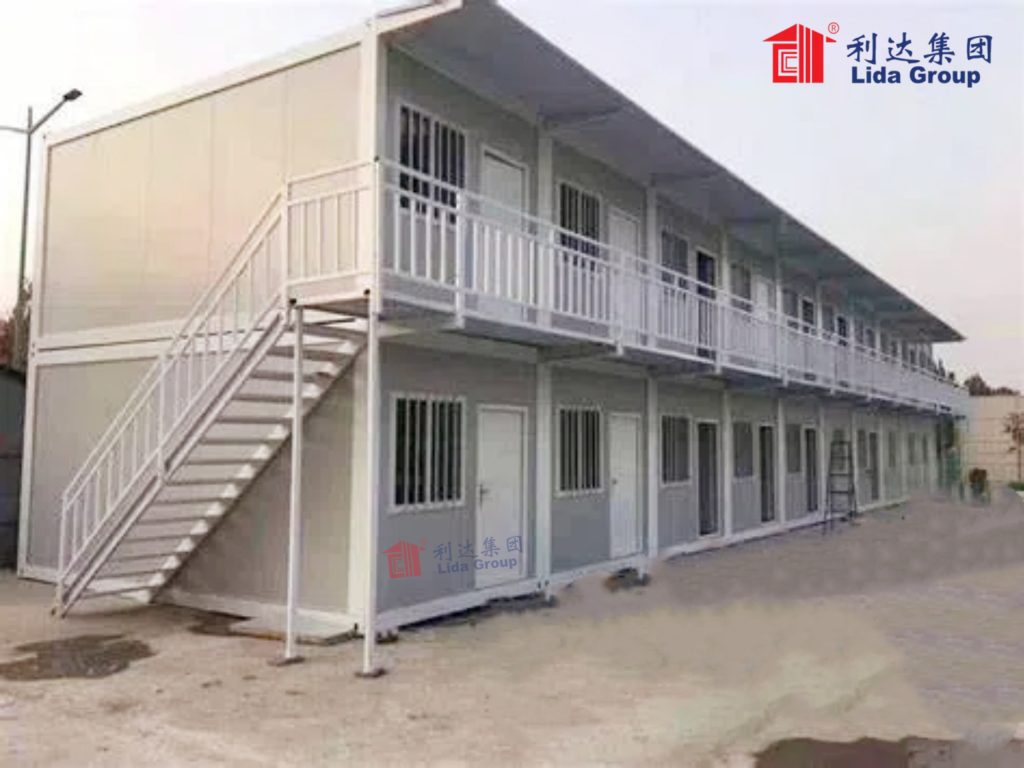
Future Trends and Innovations in Prefab Construction
Looking ahead, Lida Group is poised to lead the way in advancing the future of prefab construction through cutting-edge technological integrations and continuous innovation. One promising development is the incorporation of artificial intelligence (AI) and machine learning algorithms into their design processes. AI-powered tools can analyze vast amounts of data to identify patterns and recommend improvements, enhancing overall efficiency and precision. For instance, predictive analytics can anticipate potential issues before they arise, allowing for proactive adjustments and minimizing costly delays. This technology will enable Lida Group to streamline workflows, optimize resource allocation, and deliver higher-quality structures faster than ever before.
Blockchain technology is another area of exploration for Lida Group. By integrating blockchain into their supply chain management, they aim to ensure transparency and traceability of materials from source to final product. Blockchain’s immutable ledger records every transaction, making it easier to verify the authenticity and sustainability of raw materials used in prefab construction. This level of accountability not only builds trust with clients but also supports broader sustainability goals by promoting ethical sourcing practices. Moreover, blockchain can facilitate secure and efficient financial transactions, reducing administrative burdens and enhancing cash flow management.
Enhanced customization remains a cornerstone of Lida Group’s innovation strategy. Leveraging augmented reality (AR) and virtual reality (VR) technologies, they offer clients immersive experiences during the design phase. AR apps allow users to visualize how different materials and finishes will look in their space, while VR simulations enable them to walk through a virtual version of their future building. These tools empower clients to make informed decisions and personalize their structures down to the smallest detail. Customization extends beyond aesthetics; it includes tailoring functionalities to meet specific operational needs, ensuring that each prefab container is purpose-built for its intended use.
Sustainability initiatives continue to drive many of Lida Group’s innovations. They are actively researching new materials and construction techniques that further reduce environmental impact. For example, biodegradable composites made from plant-based fibers are being explored as alternatives to traditional plastics and metals. These eco-friendly materials not only minimize carbon footprints but also promote circular economy principles by being recyclable or compostable at the end of their lifecycle. Additionally, Lida Group is investigating the use of carbon capture technologies to offset emissions generated during the manufacturing process, aligning with global sustainability objectives.
Safety enhancements are another focal point of future developments. Smart sensor systems integrated into prefab containers can detect potential hazards such as gas leaks, fire outbreaks, or structural weaknesses, triggering alerts for immediate action. Fire-resistant coatings and barriers are being further developed to protect occupants and assets. These innovations not only enhance the security of the buildings but also instill confidence in users, knowing that they are safeguarded against unforeseen risks.
By embracing these forward-looking trends and innovations, Lida Group aims to push the boundaries of what is possible in prefab construction. Their commitment to integrating advanced technologies, promoting sustainability, and offering enhanced customization positions them as a leader in the industry. As they continue to evolve and meet the evolving needs of their clients, Lida Group remains dedicated to shaping the future of construction, delivering exceptional value and satisfaction with every project they undertake.
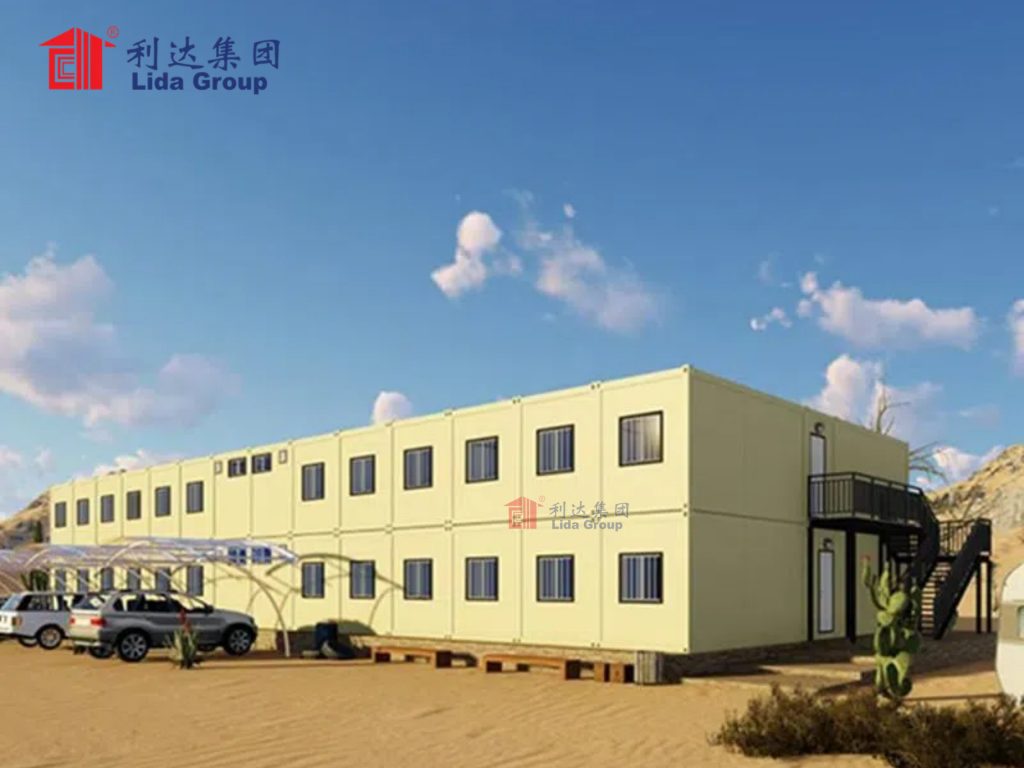
Conclusion
In conclusion, Lida Group’s contributions to disaster relief through their innovative temporary container buildings are nothing short of transformative. Their unique combination of modularity, durability, ease of setup, and enhanced safety and comfort makes these structures indispensable assets in the face of emergencies. The case studies presented highlight the practical benefits and life-saving potential of their solutions, demonstrating how these prefab units can rapidly address diverse challenges faced by communities in distress. Whether providing medical care, temporary shelters, emergency command centers, or logistical support, Lida Group’s containers have proven to be versatile and effective tools in the hands of first responders and humanitarian organizations.
The company’s commitment to continuous improvement and innovation sets it apart in the construction industry. By incorporating advanced technologies such as AI, blockchain, AR, and VR, Lida Group enhances the precision, efficiency, and personalization of their offerings. Their focus on sustainability through the use of eco-friendly materials and carbon capture technologies further cements their position as a leader in green construction practices. These advancements not only improve the quality of their products but also contribute to broader societal and environmental goals.
As Lida Group looks toward the future, their holistic approach to disaster relief and construction promises continued growth and success. Their dedication to excellence, innovation, and sustainability ensures that they remain a trusted partner in global humanitarian efforts. Through their unwavering focus on delivering exceptional value and satisfaction, Lida Group is poised to shape the future of construction, bringing hope and resilience to those most in need.
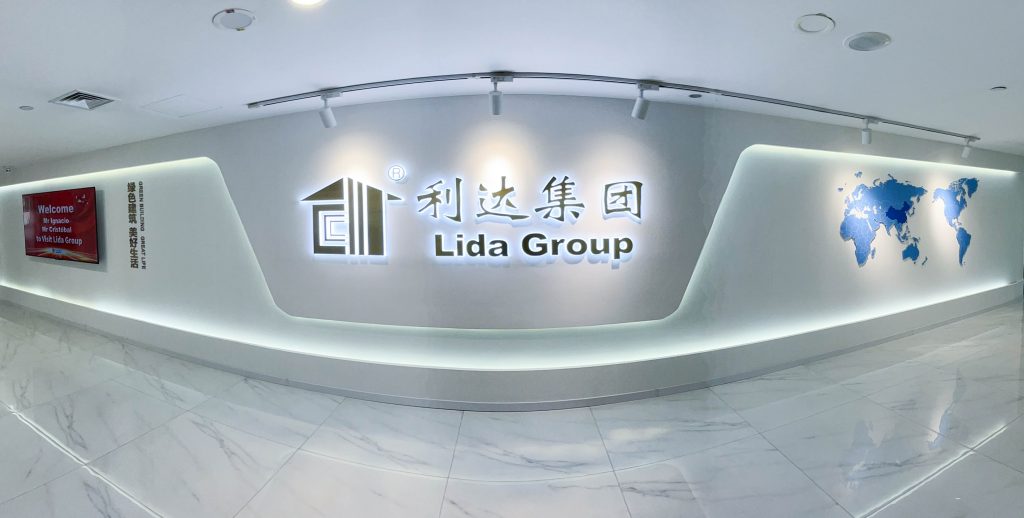
Related news
-
Lida Group Champions Cost-Effective Prefab Construction Methods
2025-10-29 16:03:46
-
Rapid Deployment with Lida Group's Prefab Mobile Container House
2025-10-29 16:10:27
-
Lida Group's Prefab Mobile Container House Reduces Build Times
2025-10-29 15:52:38
contact us
- Tel: +86-532-88966982
- Whatsapp: +86-13793209022
- E-mail: sales@lidajituan.com


